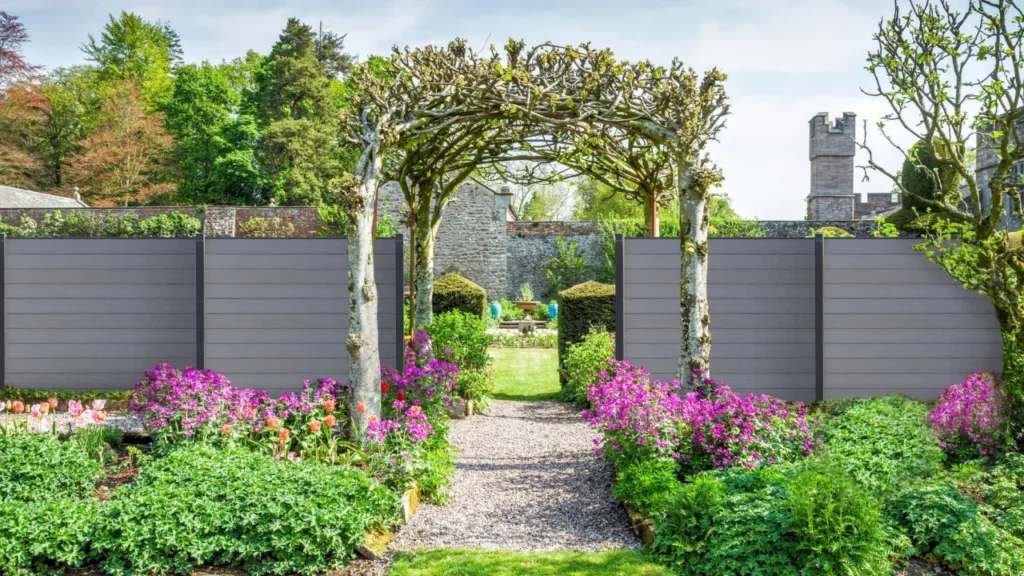Comprehensive Guide to Choosing Composite Garden Gates

composite garden gates
Garden gates are more than just a boundary marker; they play a significant role in the overall aesthetics and security of your garden. Traditionally, gates were made from materials like wood or metal, but in recent years, composite garden gates have become increasingly popular. These gates combine various materials to offer a blend of durability, low maintenance, and style. This guide will explore what composite garden gates are, their benefits, and how to choose the right one for your garden.
What Are Composite Garden Gates?
Definition of Composite Materials
Composite materials are engineered products made from a mix of different substances to enhance their properties. For garden gates, composites often include a combination of wood fibers and plastic, creating a material that mimics the look of wood but with improved performance. This blend offers the aesthetic appeal of traditional wood while providing the strength and weather resistance of plastic.
How Composite Garden Gates Are Made
Composite garden gates are crafted by combining wood fibers with recycled plastics through a process of heating and molding. This method results in a strong, durable material that resists warping, rotting, and insect damage. The process also allows for the production of gates in various colors and styles, making it easier to match your gate with your garden’s design.
Comparison with Traditional Materials
When compared to traditional materials like wood and metal, composite garden gates offer several advantages. Wood gates, while classic, require regular maintenance to prevent rot and decay. Metal gates can be prone to rust, especially in humid or coastal environments. Composite gates, however, are designed to withstand the elements with minimal upkeep, making them a practical choice for many homeowners.
Benefits of Composite Garden Gates
Durability and Weather Resistance
Composite garden gates are renowned for their durability and resistance to harsh weather conditions. Unlike wood, which can deteriorate over time due to exposure to rain and sunlight, composite gates are designed to resist moisture and UV rays. This means they will maintain their appearance and structural integrity longer, even in extreme weather conditions.
Low Maintenance Requirements
One of the standout benefits of composite garden gates is their low maintenance needs. Unlike wood gates that require regular sanding, staining, or painting, composite gates need only occasional cleaning with soap and water. This ease of maintenance saves time and effort, allowing you to enjoy your garden without frequent upkeep.
Aesthetic Options and Customization
Composite gates come in a variety of styles, colors, and finishes, offering flexibility in design. Whether you prefer a modern, sleek look or a more traditional appearance, composite materials can be manufactured to suit your preferences. This customization ensures that your gate will complement your garden’s design and enhance its overall visual appeal.
Environmental Considerations and Sustainability
Composite materials often include recycled plastics, making them a more environmentally friendly option compared to traditional materials. By choosing a composite garden gate, you contribute to reducing plastic waste and conserving natural resources. Additionally, the long lifespan of composite gates means fewer replacements, which further benefits the environment.
Factors to Consider When Choosing Composite Garden Gates
Size and Design
Selecting the right size and design for your composite garden gate is crucial for both functionality and aesthetics. Measure the entrance to ensure the gate fits properly and consider the design elements that will enhance your garden’s look. Composite gates come in various sizes and styles, so choose one that complements your garden’s overall theme.
Color and Finish Options
Composite garden gates are available in a range of colors and finishes, allowing you to match or contrast with your garden’s décor. Whether you prefer a natural wood grain look or a solid color, there are plenty of options to suit your taste. Consider how the gate’s color and finish will blend with other elements in your garden for a cohesive appearance.
Security Features
While composite gates are generally sturdy, it’s important to consider additional security features to enhance safety. Look for gates with strong locking mechanisms and secure hinges to ensure they provide adequate protection for your property. Some gates also come with built-in features like intercom systems or electronic locks for added convenience and security.
Cost vs. Longevity
When evaluating composite garden gates, it’s essential to balance cost with longevity. Although composite gates may have a higher upfront cost compared to wood or metal, their durability and low maintenance requirements often make them a cost-effective choice in the long run. Consider your budget and how long you plan to keep the gate when making your decision.
Installation Tips for Composite Garden Gates
Preparing the Site
Proper site preparation is key to a successful gate installation. Ensure that the area where the gate will be installed is level and free of obstructions. Remove any old gates or debris and check for any underground utilities that might interfere with the installation process. Proper preparation will help ensure a smooth and efficient installation.
Basic Installation Steps
Installing a composite garden gate typically involves setting up posts, attaching hinges, and hanging the gate. Start by installing the gate posts securely in the ground, ensuring they are level and spaced correctly. Next, attach the hinges to the gate and the posts, and then hang the gate, making adjustments as needed to ensure it swings smoothly and aligns properly.
Common Mistakes to Avoid
Avoid common installation mistakes such as improperly spacing posts or failing to level the gate. These issues can lead to misalignment and functional problems. Additionally, ensure that all screws and hardware are tightly secured to prevent the gate from becoming loose over time. Following the manufacturer’s instructions carefully can help you avoid these pitfalls.
When to Hire a Professional vs. DIY
While installing a composite garden gate can be a DIY project, consider hiring a professional if you are unsure about the process or if the installation involves complex elements. Professionals have the experience and tools needed to ensure a proper installation, which can save you time and avoid potential issues.
Maintenance of Composite Garden Gates
Regular Cleaning Practices
To keep your composite garden gate looking its best, regular cleaning is important. Use mild soap and water to wash the gate, removing dirt and grime. Avoid harsh chemicals or abrasive cleaners that could damage the surface. Regular cleaning helps maintain the gate’s appearance and ensures its longevity.
Repairing Minor Damages
Composite gates are designed to be durable, but minor damages can occur over time. For small scratches or dents, you can use a touch-up kit or filler recommended by the manufacturer. Addressing these issues promptly can prevent them from becoming more significant problems.
Ensuring Longevity and Performance
To ensure the longevity and performance of your composite garden gate, follow the manufacturer’s care instructions and avoid exposing the gate to extreme conditions beyond its designed tolerance. Regular inspections and timely repairs will help keep the gate in optimal condition for years to come.
Top Brands and Models of Composite Garden Gates
Overview of Popular Brands
Several brands are known for producing high-quality composite garden gates. Brands such as Trex, CertainTeed, and TimberTech offer a range of styles and options to suit various preferences and budgets. Researching these brands can help you find a gate that meets your needs and expectations.
Key Features and Customer Reviews
When evaluating different models, consider features such as durability, ease of maintenance, and aesthetic appeal. Customer reviews can provide valuable insights into the performance and quality of different gates. Look for feedback on the gate’s longevity and the manufacturer’s customer service.
Recommendations Based on Different Needs and Budgets
Depending on your specific needs and budget, certain brands and models may be more suitable. For example, if you prioritize durability and minimal maintenance, a high-end model from a reputable brand might be worth the investment. Conversely, if you’re looking for a more affordable option, explore models that offer a good balance of quality and cost.
Conclusion
Composite garden gates offer a modern, durable, and low-maintenance alternative to traditional gate materials. By understanding their benefits and considering factors like size, design, and cost, you can make an informed decision that enhances your garden’s functionality and appearance. With proper installation and maintenance, a composite gate can provide lasting value and beauty for your home.






